
Image by Hubert de Thé from Pixabay
Call for Leadership
Student leaders from the Anti-Discrimination Student Movement have suggested that Nobel Laureate Dr. Muhammad Yunus should lead an interim government to address Bangladesh's current issues, as reported by the Dhaka Tribune.
The proposal was made public through a video message released early Tuesday by prominent student leaders Nahid Islam, Asif Mahmud and Abu Bakar Mazumdar. Nahid Islam had previously mentioned on Monday night that a plan for an interim government would be developed within the next 24 hours.
Political Context
This suggestion follows the resignation of Bangladesh's Prime Minister Sheikh Hasina, who left the country after a violent crackdown on protests. These demonstrations began over job quotas but grew into a broader movement demanding Hasina's resignation.
Urgency Due to Violence With continued violence throughout Monday night, student leaders felt compelled to quickly announce their position even if it meant doing so in the middle of the night.
Presidential Approval
On Monday night, President Mohammed Shahabuddin approved the formation of an interim government. A subsequent meeting at the presidential palace, Bangabhaban was convened to discuss the country's worsening law and order situation. The meeting included top military officials, political party leaders and civil society representatives.
Recent Political Developments in Bangladesh: Leadership Meeting at Bangabhaban
A significant decision emerged from a crucial meeting at Bangabhaban, where the current situation in Bangladesh was evaluated. Present at this meeting were the chiefs of the Army, Navy, and Air Force along with leaders from various political parties and civil society members. This decision was later announced in a press release by Muhammad Shiplu Zaman, Assistant Press Secretary of Bangabhaban.
Army's Role in Ensuring Law and Order
Following the meeting, the Army has been given the responsibility of stopping acts of vandalism and restoring law and order. This intervention became necessary after Prime Minister Sheikh Hasina left the country on Monday afternoon, leading to a significant deterioration in the law enforcement situation.
BNP Leadership Updates
In a parallel development, Bangladesh Nationalist Party (BNP) Secretary General Mirza Fakhrul Islam Alamgir revealed that Tarique Rahman and the party's acting chairman is expected to return to the country soon. He conveyed this information to the media on Monday evening.
Statements from Mirza Fakhrul Islam Alamgir
Mirza Fakhrul expressed that Tarique Rahman had been wrongfully exiled due to false allegations but has continuously supported the BNP's movement. He announced steps are being taken to facilitate Tarique's immediate return by expressing confidence in their success.
Additionally, he mentioned that BNP leader Begum Khaleda Zia is set to be released shortly along with others imprisoned for political reasons. He called for unity among political parties, students, and the public to manage the current situation collaboratively.
Protests in Bangladesh: A Call for Reform as Student Demonstrations Spark Mass Protests
In Bangladesh, student demonstrations ignited a wave of mass protests demanding reforms to the civil service quota system. Students argued that the existing quotas unfairly favoured loyalists of Prime Minister Sheikh Hasina's ruling party, the Awami League.
Broader Discontent with the Government
As the protests grew, demonstrators expressed wider discontent with Hasina's government by accusing it of:
- Autocratic practices.
- Suppressing dissent.
Government Response Fails to Ease Unrest
The government's attempts to quell the protests, including closing schools and universities, only fuelled the unrest.
- Supreme Court Ruling Falls Short: A Supreme Court ruling against reintroducing job quotas did not fully satisfy the protesters, who continue to demand the abolition of all job reservations for children of "freedom fighters." This partial concession has done little to calm the movement.
- Military Intervention Escalates Tensions: The situation intensified when Former army chief General Ikbal Karim Bhuiyan criticized the government's handling of the protests and called for troop withdrawal. The current army chief expressed support for the protesters, further fuelling the unrest.
A Call for Peace and Unity
Addressing the nation, Mirza Fakhrul emphasized the need for calm and unity following what he described as a significant victory. He urged everyone to avoid actions driven by anger or hatred and to refrain from attacking any institutions or individuals, particularly religious minorities.
Mirza Fakhrul highlighted the collective responsibility to protect minority communities, urging his party members to prevent any harm from befalling others and to resist giving miscreants any opportunity to cause trouble. This call for peace and protection reflects a broader commitment to maintaining harmony and stability in the nation amidst these turbulent times.
Importance of a Peaceful Transition: Emphasizing Peaceful and Transparent Transition
Volker Turk, the United Nations High Commissioner for Human Rights, highlighted the necessity of a peaceful and transparent transition of power in Bangladesh. He emphasized that this process should involve all citizens of the country in a meaningful way.
- Guided by Human Rights: Turk stated that the transition should adhere to human rights principles and align with Bangladesh’s international commitments. He stressed that those responsible for violence, which has resulted in numerous deaths and injuries, must be held accountable.
- Inclusive Participation: Turk pointed out that the transition must be transparent, accountable and inclusive. He emphasized that it should allow meaningful participation from all segments of the Bangladeshi population. He strongly asserted that further violence or acts of retaliation must be prevented.
Upholding Democratic Order and Rule of Law
Turk stressed the urgency of restoring democratic order and upholding the rule of law. He called for all emergency measures to be strictly limited to what is permitted by international law. Additionally, he urged for the immediate release of individuals who have been arbitrarily detained and insisted that those responsible for human rights violations be brought to justice.
. . .
References:

